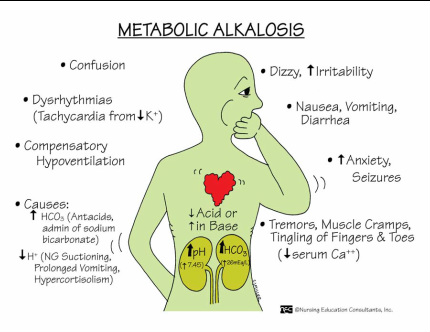Pathology definition - Metabolic Alkalosis

Metabolic alkalosis
Metabolic alkalosis may present with cardiac arrhythmias, muscle weakness, lethargy, sunken eyes, hypotension and poor skin turgor as well as decreased in the cerebral blood flow.
Metabolic alkalosis may present with increase in partial pressure of the carbon dioxide increased in pH and increase in the concentration of hydrogen bicarbonate ion. Metabolic alkalosis may be associated with hypokalemia. Hypokalemia may worsen of the metabolic alkalosis by increasing hydrogen ion secretion in the distal tubules and increase bicarbonate absorption in the proximal tubule.
The common causes of metabolic alkalosis are hyperaldosteronism, diuretics intake, antacids and vomiting.
The treatment of metabolic alkalosis is to stop any precipitating medication, consider spironolactone to block the action of aldosterone and fluid replacement.
Metabolic alkalosis may present with cardiac arrhythmias, muscle weakness, lethargy, sunken eyes, hypotension and poor skin turgor as well as decreased in the cerebral blood flow.
Metabolic alkalosis may present with increase in partial pressure of the carbon dioxide increased in pH and increase in the concentration of hydrogen bicarbonate ion. Metabolic alkalosis may be associated with hypokalemia. Hypokalemia may worsen of the metabolic alkalosis by increasing hydrogen ion secretion in the distal tubules and increase bicarbonate absorption in the proximal tubule.
The common causes of metabolic alkalosis are hyperaldosteronism, diuretics intake, antacids and vomiting.
The treatment of metabolic alkalosis is to stop any precipitating medication, consider spironolactone to block the action of aldosterone and fluid replacement.
